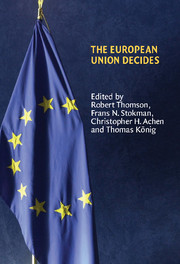Book contents
- Frontmatter
- Contents
- List of figures
- List of tables
- Notes on contributors
- Preface
- 1 Explaining legislative decision-making in the European Union
- 2 Research design: measuring actors' positions, saliences and capabilities
- 3 Testing procedural models of EU legislative decision-making
- 4 Institutional realism and bargaining models
- 5 Compromise, exchange and challenge in the European Union
- 6 Nash versus Schelling? The importance of constraints in legislative bargaining
- 7 A cooperative approach to decision-making in the European Union
- 8 A procedural exchange model of EU legislative politics
- 9 Beyond informal compromise: testing conditional formal procedures of EU decision-making
- 10 Evaluating political decision-making models
- 11 Evidence with insight: what models contribute to EU research
- Appendix I Selection of Commission proposals
- Appendix II Comparison of expert judgements with each other and with information from Council documentation
- References
- Index
- Title in this series
10 - Evaluating political decision-making models
Published online by Cambridge University Press: 22 September 2009
- Frontmatter
- Contents
- List of figures
- List of tables
- Notes on contributors
- Preface
- 1 Explaining legislative decision-making in the European Union
- 2 Research design: measuring actors' positions, saliences and capabilities
- 3 Testing procedural models of EU legislative decision-making
- 4 Institutional realism and bargaining models
- 5 Compromise, exchange and challenge in the European Union
- 6 Nash versus Schelling? The importance of constraints in legislative bargaining
- 7 A cooperative approach to decision-making in the European Union
- 8 A procedural exchange model of EU legislative politics
- 9 Beyond informal compromise: testing conditional formal procedures of EU decision-making
- 10 Evaluating political decision-making models
- 11 Evidence with insight: what models contribute to EU research
- Appendix I Selection of Commission proposals
- Appendix II Comparison of expert judgements with each other and with information from Council documentation
- References
- Index
- Title in this series
Summary
HOW WELL DO THE MODELS FORECAST?
Stocks have reached what looks like a permanently high plateau.
Irving Fisher, prominent professor of mathematical economics at Yale University, 17 October 1929The previous chapters in this book have elaborated many different models of political decision-making in the European Union. To make their forecasts, some of these models focus on the incentives created by EU legal regulations or decision-making rules. Other models emphasise the power of bargaining in political decision-making. Still others start from logrolling, coalitions, or the spatial theory of voting.
The aim of this book is to set out all these models of EU decision-making, and then to evaluate how well the models predict actual decisions. Most of the discussion is quantitative. Yet in important respects, we mean to integrate prior case studies, formal theory, and statistical methods. For example, each of the modelling approaches represented in this book builds on one or more central aspects of political life known from dozens of skilful case studies of political decisions. All competent model-building depends on careful qualitative research in which explanatory factors are identified and tentative empirical generalisations are formulated. No model is worthwhile if, like some formal theorising, it applies to nothing in particular. Case studies have generated most of the interesting hypotheses in political science. They are the essential foundation for most model building.
Moreover, case studies play a crucial role in evaluating theory.
- Type
- Chapter
- Information
- The European Union Decides , pp. 264 - 298Publisher: Cambridge University PressPrint publication year: 2006
- 58
- Cited by



